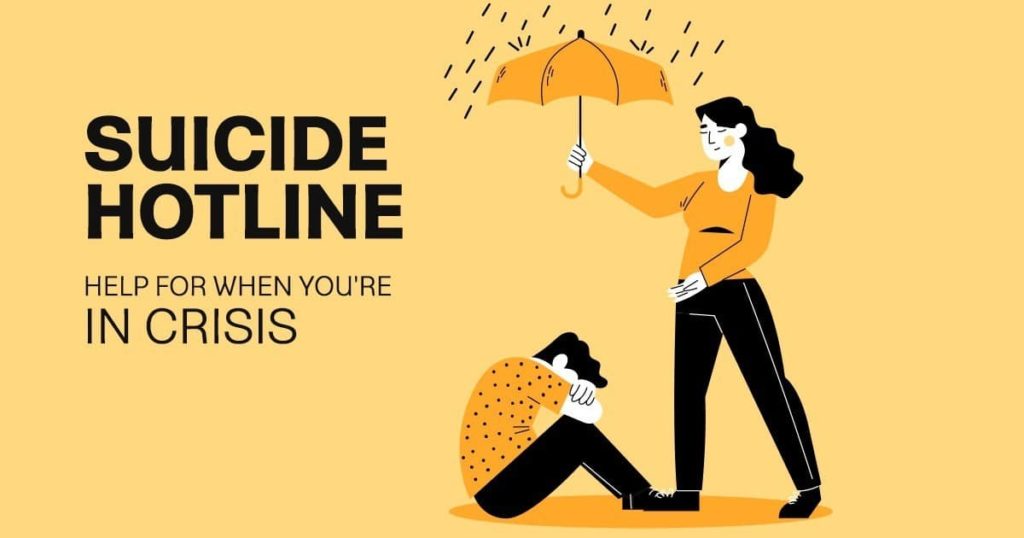Suicide is the second-leading cause of death in the United States for adults. It’s the third leading cause for teenagers; around 20% of teens experience a severe mental health crisis at some point. According to the Mental Health Services Administration, there is one death by suicide every 11 minutes.
The utilization of a suicide hotline would dramatically reduce these numbers, and this article will equip you with all of the knowledge you need to help save a life, maybe even your own.
Before moving on, it’s important to note that if you are ever in the midst of a mental health crisis, know that help is available. There are immediate resources, from emergency services providers to teams that operate suicide hotlines.
Below we’ll go into some facts you should know for crisis intervention for a mental health emergency.
Understanding Suicide
Many of us have been affected by suicide, whether directly or indirectly.
The Centers for Disease Control and Prevention reports that between 1999 and 2019, suicide rates have gone up 33%; overall, for any age group, it’s the 10th leading cause of death in this country. In 2019, 12 million American people in crisis reported seriously contemplating suicide. An estimated 3.5 million planned an attempt, and 1.4 million followed through with a suicide attempt.
While this can all sound upsetting, and it is, there is good news. Around 90% of people attempt suicide but survive; part of that is thanks to suicide prevention services like the suicide hotline.
Suicide Related to Mental Health Disorders
Some mental health professionals consider suicide a symptom of mental illness. When you have a mental health condition classified as a mood disorder (like chronic depression, bipolar disorder, schizoaffective disorder, etc.), it’s common for people in crisis to consider suicide to solve their emotional distress.
People in distress don’t realize that their symptoms are treatable through crisis counseling, chat services, behavioral health treatment service, medication, and more. Suicide is a permanent decision to solve a temporary problem. The transient nature of these issues exemplifies why crisis hotlines are critical for people with mental health issues. Counselors can de-escalate a situation and put a person in the right state of mind to understand their feelings of despair are only temporary and help set them on a track to feel better.
Suicide Is Preventable
If you’ve never heard it said before, the reality is that suicide is preventable. We can all play a role in preventing suicide, starting by understanding it’s not inevitable. So what can we all do in a general sense to prevent suicide?
Talking about it, reducing access to ways people harm themselves, and following up with the people we care about have proven helpful. By learning the warning signs of suicide, we’re all also helping to make a difference. Some of the warning signs of suicide include:
- Talking about wanting to die
- Feeling like a burden to other people
- Experiencing shame or guilt
- Hopeless or empty
- Feeling sad, agitated, angry, or rageful
- Making a plan or researching different ways to die
- Withdrawing from loved ones
- Saying goodbye
- Giving away possessions
- Making a will
- Taking extreme risks
- Mood swings
- Eating less or more
- Sleeping less or more
- Using drugs or alcohol more often
How to Help Yourself If You’re Dealing with Thoughts of Suicide
If you’re dealing with signs of suicide, it’s not a flaw in your character, and it makes you neither crazy nor weak. It does mean that you are dealing with overwhelming sadness or pain.
So, what can you do?
Call the National Suicide Prevention Hotline at 800-273-8255. There are trained staff available to speak to you at any time.
So exactly what happens if you call a depression hotline or suicide hotline?
- There’s no minimum age when you call a hotline, such as the Suicide Prevention Hotline or a depression hotline.
- People are available all the time to talk to you, including on holidays.
- When you first call, you may hear an automated message telling you that they will direct you to a crisis center in the network while you stay on the line.
- The Lifeline suicide hotline, just as an example, is made up of 161 crisis centers around the country, with professionals and volunteers staffing them. When you call, an operator routs you to the crisis center closest to where you are.
- Location routing is critical because the staff you speak to will be aware of local resources in your community.
- There’s also a backup network if your crisis center has many calls or your community doesn’t have a center.
- When you speak to someone, they will be a trained crisis counselor.
- Mental health professionals are trained to talk calmly, use active listening and determine risk.
- Stay on the call for as short or as long as you’d like.
- Share whatever you’re comfortable with and talk about anything you want to.
- A lifeline crisis chat follows no script, so there’s an open dialogue; they may ask you questions, however, to see how to get you the best help.
- If it’s a high-risk situation, a crisis worker will try to develop a safety plan.
- In rare cases, a mental health professional might contact the local authorities to ensure safety if there seems to be imminent danger.
Finding Alternative Options
Along with calling the suicide prevention hotline, you have another option available to you, in which you might be more comfortable. You can text the Crisis Text Line at 741-741. You can still receive completely confidential support 24/7. Many of us may feel more able to talk openly through online chat when we text instead.
If you’re not in an immediate crisis, but you are dealing with thoughts of suicide, talking with a doctor or therapist is something you should do as soon as you can.
What Can You Do If Someone Else is Suicidal?
If you have a friend, family member, or loved one dealing with suicidal thoughts, it can be highly upsetting. Many of us aren’t sure exactly what to do in these situations. Too often, we fear that if we do try to intervene, it could make things worse, but it may save someone’s life. Taking action is the best thing you can do.
- Ask questions: If someone appears to be thinking about hurting themselves, be direct and ask them questions, but also balance that with sensitivity. For example, ask them if they’re thinking about hurting themselves or about suicide. You’re not going to push someone into suicide if you ask them questions, and you might reduce the risk of them hurting themselves.
- Get immediate help: When you think someone is imminently going to hurt himself or they’ve attempted suicide, don’t leave them alone. Call 911 or your local emergency services provider right away.
- Call a suicide hotline: Your loved one is talking about things that make you think they might try to commit suicide, don’t handle it alone. Get help from a professional as soon as you can.
The most important takeaway that we hope you get from this guide is that you aren’t alone. Calling a suicide hotline can be life-saving, and we encourage you to know resources are available for suicide.
Short and Long Term Help
For emergencies, you can reach out to the National Suicide Prevention Lifeline 800-273-TALK (800-273-8255); this national hotline will be able to help connect you with emergency resources in your area. However, suicidal tendencies are an indicator of a more significant issue, usually related to mental illness.
If you are having a difficult time and you’re considering suicide as an option, it’s highly recommended to contact the Mental Health Center of San Diego ((858) 258-9883). Our treatment facilities can help give you a diagnosis and treatment that will make your struggles feel manageable. Suicide is never an option; get help today.
[qsm quiz=1]















